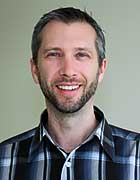
Dr. Jeffrey McLean, an associate professor of periodontics at the School of Dentistry, has been named to a three-year term as a member of the Oral, Dental and Craniofacial Sciences Study Section at the Center for Scientific Review. The center is part of the National Institutes of Health (NIH).
Study sections review grant applications submitted to the NIH, make recommendations on these applications to the appropriate NIH national advisory council or board, and survey the status of research in their fields of science.
“These functions are of great value to medical and allied research in this country,” said Dr. Noni Byrnes, the center’s director, in a letter announcing the appointment.
Members are chosen based on their demonstrated competence and achievement in their scientific discipline as evidenced by the quality of research accomplishments, publications in scientific journals, and other significant scientific activities, achievements and honors.
Dr. McLean received his PhD at the University of Southern California and his MSc at the University of Guelph in Canada. Before coming to the University of Washington in 2014, Dr. McLean had worked as a researcher at the Pacific Northwest National Laboratory in Richland, Wash., and the J. Craig Venter Institute in La Jolla, Calif., a highly regarded center of genomic research.
Much of his work has focused on microbial interactions in oral biofilm communities. In 2014, he and his research colleagues published a groundbreaking study of microbial “dark matter,” or bacteria whose existence had been known but which defied efforts at cultivation.
A few months later, he and research colleagues at UCLA published a study showing how an engineered microbial peptide could kill the bacteria that cause tooth decay without harming the mouth’s beneficial bacteria.
This year, he and colleagues published a study in Proceedings of the National Academy of Sciences that showed how a larger genetic inventory may help explain how certain dangerous bacteria can persist in a hospital environment and continue to infect patients.
“There’s a huge number of bacteria we never know anything about,” he said in an article in the UW Dental Alumni News in the spring of 2017. “Three of these groups are in the oral cavity, and we’re working on cultivating and sequencing all of them in the body. We want to learn how they affect each other and our cells.”